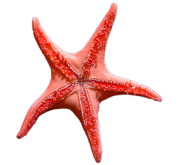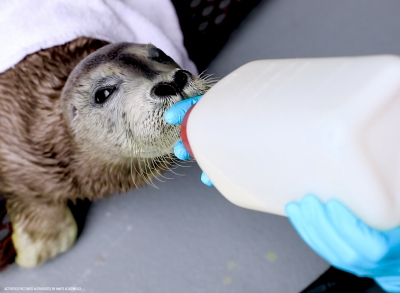Alaska SeaLife Center Admits Bearded Seal Pup May 9, 2019
Seward, Alaska (May 9, 2019) –On April 13, the Alaska SeaLife Center (ASLC) admitted a one-week-old bearded seal pup into their Wildlife Response Program.
The female pup was observed on the shores of Shaktoolik by local residents. A few school children in the village took it upon themselves to ensure the seal wasn’t harassed by people or pets. Ice seals are hunted for subsistence purposes in many northern villages of Alaska, but since the children became attached to this particular animal, the village decided to call ASLC for help. Village Police Officer, Jeffery Paniptchuk, played a crucial role in transporting the seal from the village to Ravn Air. He located the pup after National Oceanic and Atmospheric Administration (NOAA) granted permission to secure the animal.
Upon arrival to the Center, ASLC staff noted the pup was extremely underweight. Adding weight onto a young bearded seal is no simple task. In the wild, bearded seal pups gain three times their weight within a few weeks of birth, indicating mother’s milk has a high fat content. “If you feed too much fat to a starving animal too quickly it can be harmful. We have to take her weight gain slow to make sure her body can process the nutrients,” states Wildlife Response Curator, Jane Belovarac. Since this is one of the few bearded seal pups in ASLC’s history, a special formula was created for her with the vet staff taking elements from walrus, harbor seal, and fish gruel formulas.
Because this pup was extremely underweight upon arrival, it had trouble regulating body temperature, especially when swimming. “When she first started swimming, staff had to assist her out of the water to ensure she didn’t get too cold,”states Husbandry Director, Lisa Hartman. Staff are working to increase her blubber layer through regular feedings every four hours.
The last time ASLC responded to a bearded seal in distress was 2002. This animal is non-releasable due to the National Marine Fisheries Service policy established for the four species of Alaskan ice seals. Ribbon, bearded, spotted, and ringed seals are considered non-releasable in the state due to consideration of subsistence hunters.
![]() The Alaska SeaLife Center is a 501(c)(3) not-for-profit organization and the only permitted marine mammal rehabilitation center in Alaska. Over 80% of the funding for ASLC’s Wildlife Response Program comes from charitable donations. The Center is thankful for organizations like, BP Alaska, ConocoPhillips Alaska, SeaWorld & Busch Gardens Conservation Fund, GCI and PetZoo whose generous support helps ASLC care for marine mammals in need.
The Alaska SeaLife Center is a 501(c)(3) not-for-profit organization and the only permitted marine mammal rehabilitation center in Alaska. Over 80% of the funding for ASLC’s Wildlife Response Program comes from charitable donations. The Center is thankful for organizations like, BP Alaska, ConocoPhillips Alaska, SeaWorld & Busch Gardens Conservation Fund, GCI and PetZoo whose generous support helps ASLC care for marine mammals in need.
ASLC operates a 24-hour stranding hotline where trained professionals will walk people through the proper steps to assist the animal. Call 1-888-774-SEAL if you see a marine mammal in distress.


